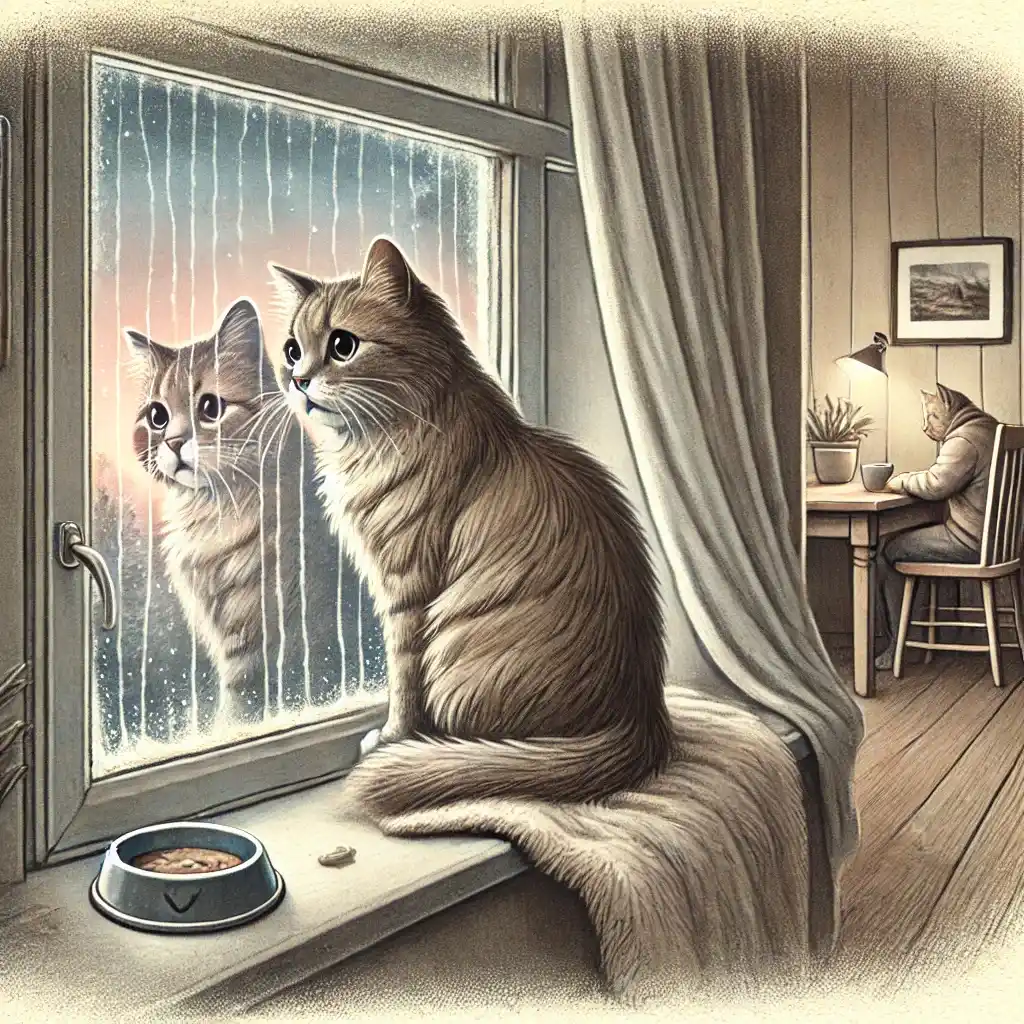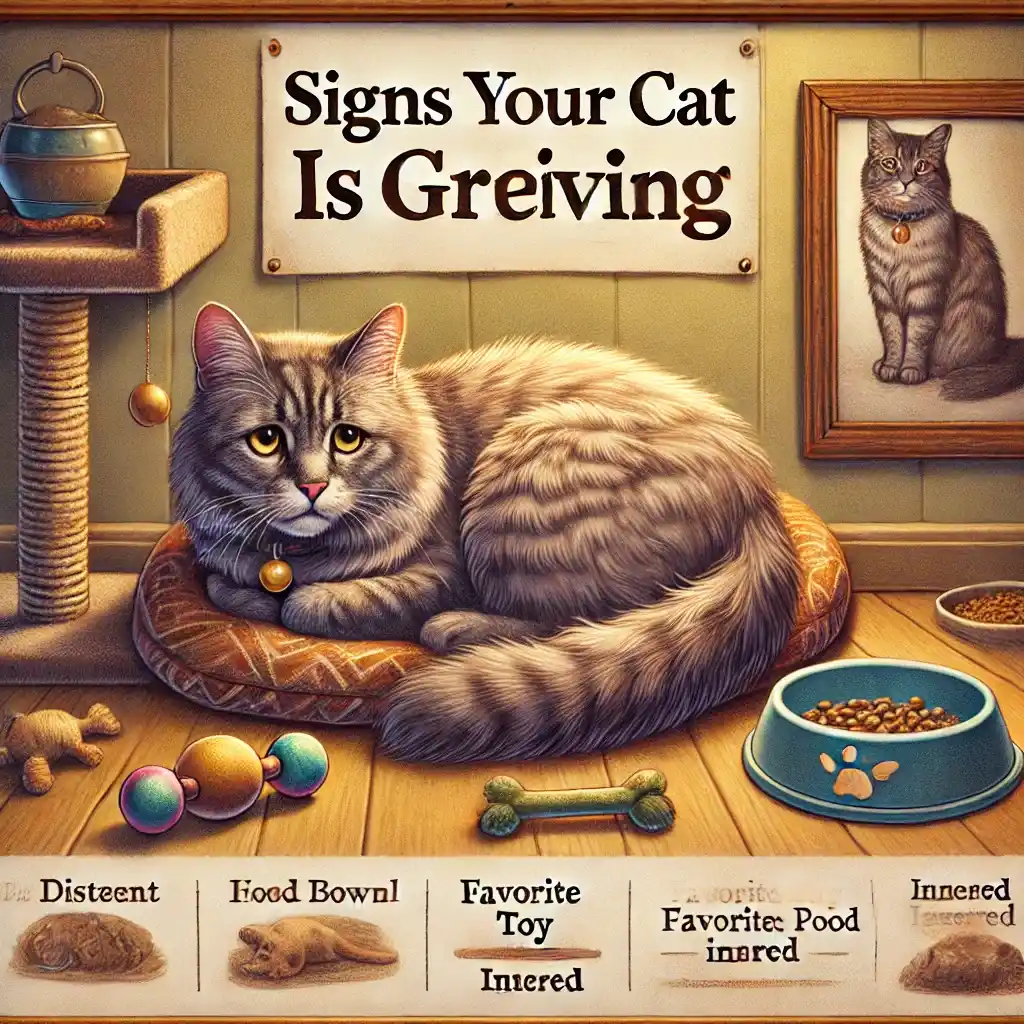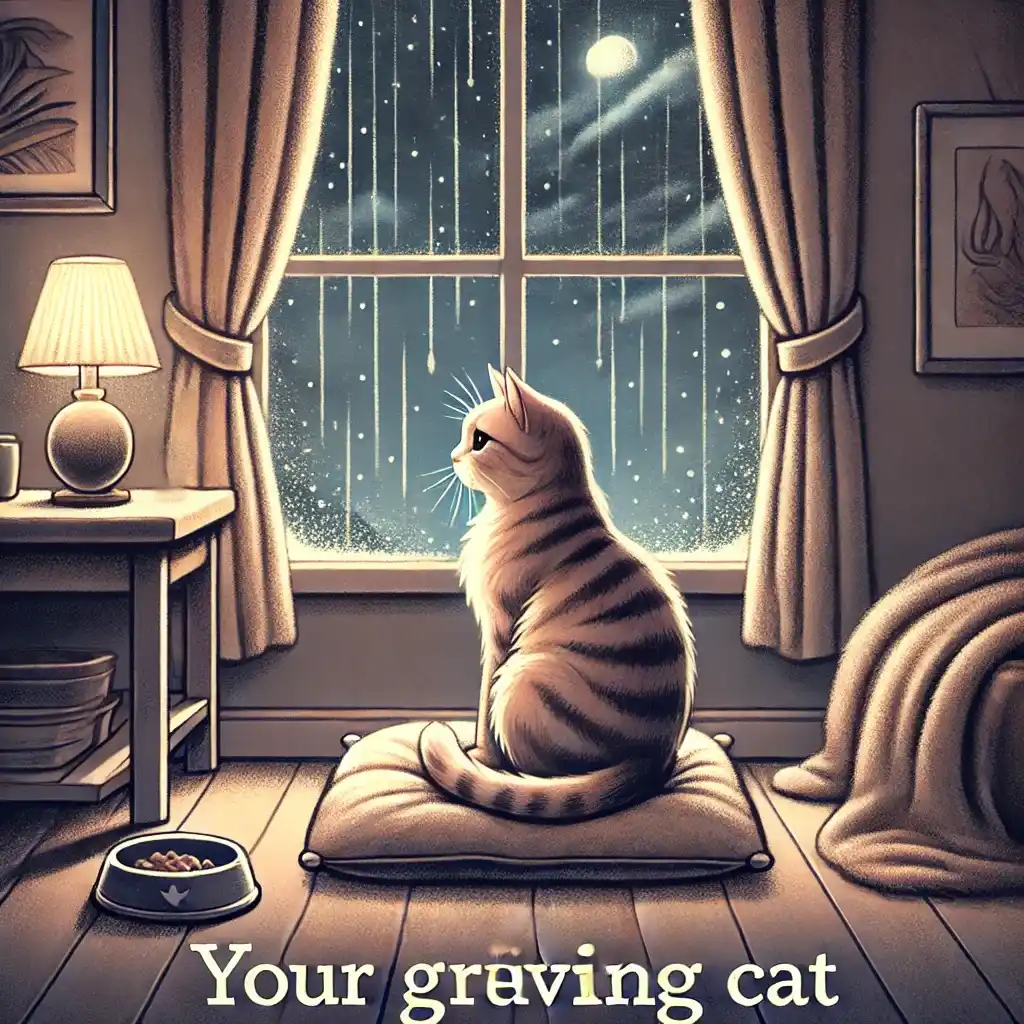Cats are intelligent, emotional creatures, and like humans, they can experience a wide range of emotions, including grief. Grief in cats can happen when they lose a companion, face an environmental change, or experience a major life shift. As a responsible pet owner, recognizing the signs of grief and knowing how to help your cat can make all the difference. This article will provide an in-depth look at the causes of grief in cats, how to recognize the signs and practical steps you can take to support your grieving cat.
1;Understanding Grief in Cats
What Is Grief in Cats?
Grief in cats, as in humans, is a response to loss. When cats experience a significant change in their lives, such as the death of a loved one, the departure of a familiar person, or the loss of another pet, they may show signs of sadness, anxiety, or confusion. While cats don’t grieve in the same way humans do, they can certainly feel emotional distress and sadness.
Grief in cats manifests differently than in humans. Cats do not typically shed tears or vocalize their sadness in a way humans can immediately recognize. Instead, their grief is reflected in behavioral and physical changes. Recognizing these signs early can ensure that your cat receives the appropriate support and care.
How Cats Process Grief
Understanding how cats process grief is key to recognizing it in your pet. Unlike humans who may verbalize their emotions, cats communicate their feelings through body language and behavior. When cats mourn, they may experience feelings of confusion, anxiety, and even depression. A cat’s grief is often deeply linked to their attachment to their human or animal companions. Cats form strong bonds with those they live with, and the absence of a companion can leave them feeling isolated and stressed.
It’s also important to note that grief is not always caused by death. Any significant change in a cat’s environment, such as moving homes, changes in family dynamics, or the introduction of new pets, can trigger a grieving response. Cats are creatures of habit, and disruptions to their routine or environment can have a strong emotional impact.

Differences in Grieving Responses
Grief responses can vary from cat to cat. Some cats may become more affectionate, seeking constant companionship from their owner or remaining close to the area where the deceased pet or person was. Others may retreat and isolate themselves, avoiding contact with people and other pets. There is no one-size-fits-all response, and understanding your cat’s personality and previous behaviors will help you interpret their reactions to grief.
Cats can also grieve for different lengths of time. Some may experience a temporary adjustment period, while others may mourn for months, especially if the loss was significant. It’s important to be patient and supportive throughout this process.
2;Signs Your Cat is Grieving
Changes in Behavior
Grieving cats may exhibit noticeable changes in behavior. One of the first signs is often a shift in their social behavior. Some cats may become more reclusive and avoid human interaction, while others may seek more attention and affection than usual. The grieving cat might act distant, refuse to play, or show irritability if approached too quickly or in ways that remind them of their loss.
Behavioral changes can also involve restlessness or pacing, particularly if the cat is struggling to adjust to the absence of a companion. If your cat becomes more vocal than usual, meowing persistently or calling out, this can also indicate distress. These behavioral shifts are often subtle but significant signs that something is emotionally wrong.
Appetite Changes
Grieving cats may experience changes in appetite, either eating too little or overindulging in food. Loss of appetite is one of the most common symptoms in grieving cats. They may seem disinterested in their food, turning away from meals, or they might stop eating altogether, leading to rapid weight loss.
On the flip side, some cats might respond to grief by eating excessively. If they find comfort in food, they might overeat as a coping mechanism, potentially leading to weight gain or digestive issues.
In any case, if your cat is not eating, drinking, or grooming themselves, it’s essential to monitor them closely. Prolonged changes in appetite can affect their health and may indicate the need for veterinary intervention.
Changes in Sleeping Patterns
Cats are known for sleeping a lot, typically between 12 and 16 hours per day. However, when grieving, a cat may experience disruptions in their sleep patterns. Some cats may sleep excessively, hiding away in dark corners or places where they feel safest. They may choose to sleep more to escape their anxiety or sadness.
Other cats may become restless and unable to sleep, moving around the house and even vocalizing at night. Restlessness may be due to the stress and anxiety that often accompany grief.
Physical Symptoms
Excessive grooming or licking is another symptom of grief in cats. Cats may lick their fur excessively, sometimes leading to hair loss or sores. This behavior could be a sign of anxiety or stress. In some cases, excessive grooming can also result in skin irritation or bald patches, especially if it’s done excessively as a coping mechanism.
Another physical symptom of grief can be pacing or restless behavior. A grieving cat may wander around the house or constantly search for their lost companion. This restlessness can be a sign of confusion or frustration due to the sudden absence.

Hiding or Seeking Comfort
Many grieving cats may retreat and hide in dark or quiet places. They might spend time alone in areas where they feel secure, like under furniture, in closets, or in their favorite spot in the house. This is often a sign that they are processing their grief and trying to find a safe space to deal with their emotions.
On the other hand, some cats may seek more affection and physical closeness from their owners, curling up in their lap or staying by their side more than usual. This behavior could be a way for the cat to find comfort and security during a time of distress.
Behavior Toward Other Pets
If you have multiple pets in the household, the grieving cat’s behavior toward them might change as well. They may become more aggressive or protective, especially if they perceive other pets as a threat or a reminder of the lost companion. Alternatively, some cats may isolate themselves from the other pets and refuse to engage with them, as they are focused on mourning.
3;Causes of Grief in Cats
Loss of a Human or Animal Companion
One of the most common causes of grief in cats is the death or absence of a companion, whether human or animal. Cats form deep attachments to their owners and other pets they live with. When a person or pet passes away, the grieving cat may feel an overwhelming sense of loss and sadness.
The absence of a beloved companion can lead to feelings of loneliness, and the cat may not understand where their friend has gone. This emotional distress can be significant, and it can take time for the cat to adjust.
Environmental Changes
Cats are creatures of habit, and changes in their environment can trigger grief-like behaviors. Moving to a new home, for example, may be highly stressful for your cat. The unfamiliar smells, sounds, and changes in routine can leave them feeling anxious and disoriented.
Similarly, the introduction of new pets or people into the household can cause a grieving response in your cat. Cats may feel territorial and insecure when a new member enters the household, and they may exhibit signs of distress as they try to adjust to the changes.
Changes in Routine
Cats thrive on routine. When their daily schedule is disrupted, whether due to changes in feeding times, walking schedules, or the sudden departure of a familiar person, cats can experience a form of emotional distress that leads to grief-like symptoms. Keeping a consistent routine can provide comfort and stability for a grieving cat.
4; How to Help Your Grieving Cat
Provide Comfort and Security
When your cat is grieving, it’s essential to provide a safe, comfortable, and quiet space where they can retreat when they feel overwhelmed. Cats enjoy having a personal space they can claim as their own. Ensure that this space is away from noise, sudden movements, or other pets that may cause additional stress.
Place their favorite blanket, toy, or other familiar items in their safe space to help them feel secure. Familiar scents can have a calming effect, reminding your cat of their comfort zone.
Increase Interaction
While grieving cats may withdraw, it’s essential to remain present in their lives. Try to engage with them in a calm and patient manner. Spend time sitting near them, speaking softly, or offering gentle petting. Interactive toys can help encourage them to play, but be mindful of their mood and energy levels.
Sometimes, grieving cats may need extra attention. If your cat seeks your affection, don’t hesitate to provide it, but respect their need for space if they pull away.
Encourage Healthy Eating and Hydration
Loss of appetite is a common symptom of grief, and it’s crucial to ensure that your cat continues to eat and drink regularly. If your cat is not eating, try to offer different types of food, such as wet food, or lightly warm their meals to make them more enticing. You can also offer treats that your cat loves as a way to coax them into eating.
Hydration is also essential, so make sure your cat has access to fresh water at all times. Some cats may be more willing to drink from a running water fountain, which can help encourage hydration.

Maintain a Calm Environment
Cats are highly sensitive to their environment, and sudden loud noises or chaotic situations can increase their anxiety. Maintain a calm atmosphere at home by minimizing stressors like loud music, strong scents, or unfamiliar guests.
If possible, keep the home’s routine as consistent as possible, even when you’re dealing with grief. This stability will provide your grieving cat with a sense of normalcy and safety.
Use of Pheromones
Consider using feline pheromone diffusers or sprays. These products release synthetic versions of the calming pheromones cats produce naturally. Pheromones can help reduce stress and anxiety, and using them in your home can create a soothing atmosphere for your grieving cat.
Monitor Health
While emotional changes are common in grieving cats, prolonged grief can also lead to physical health issues, especially if the cat refuses to eat or drink. Monitor your cat closely for any signs of illness, such as lethargy, vomiting, diarrhea, or weight loss. If the grief symptoms persist for weeks without improvement, or if health problems arise, consult a veterinarian for further advice.
5;When to Seek Veterinary Help
While grief is a natural response for cats, there are times when the symptoms may indicate a more serious issue or require professional intervention. If your cat’s grief persists or leads to physical symptoms, it’s essential to consult with a veterinarian. Here are particular scenarios that require immediate veterinary attention
Persistent Changes in Behavior
Grief can lead to significant changes in your cat’s behavior, but if these changes last for an extended period, it may be a sign that your cat is struggling more than expected. For example, if your cat continues to isolate themselves, avoid human interaction, or exhibit unusual aggression or lethargy for several weeks, it could indicate that they are not adjusting well to the loss or may be dealing with a more severe emotional or physical issue.
Cats that are grieving may show changes in their habits, such as altered sleeping patterns, lack of interest in playing, or excessive grooming. However, if the behavior does not improve over time, or if the grieving response escalates, it’s important to rule out any underlying medical conditions or behavioral disorders.
Physical Symptoms That Do Not Improve
Grieving cats may experience physical symptoms, such as a loss of appetite, changes in grooming habits, or lethargy. While these symptoms can be a normal part of the grieving process, if they persist for an extended period without improvement, it could be a sign of a health problem.
For instance:
- Loss of Appetite: If your cat refuses to eat for more than a few days, it can lead to dehydration, weight loss, and other health complications. Prolonged lack of appetite, especially if accompanied by weight loss, warrants a visit to the vet.
- Excessive Grooming or Licking: Cats may groom excessively when they are anxious or stressed, but if this leads to bald spots or skin irritation, it could be a sign of an underlying health issue.
- Lethargy: If your cat becomes unusually lethargic and does not engage in their regular activities, this could signal that something more serious is at play. Grief-induced lethargy can sometimes turn into a deeper illness.
If your cat’s physical symptoms continue without improvement, seek veterinary help to ensure that the issue is addressed appropriately.
If the Cat Is Not Eating, Drinking, or Grooming
One of the most concerning signs that your cat may need veterinary attention is when they are not eating, drinking, or grooming themselves. While mild loss of appetite is common during grief, prolonged periods without food or water can lead to dehydration and malnutrition. If your cat refuses to drink water for more than 24 hours or does not eat for an extended period, it’s important to contact your vet immediately.
Similarly, if your cat stops grooming themselves entirely, it could signal an underlying medical condition. Cats usually groom themselves regularly, and when they stop, it could indicate stress, depression, or a health issue, such as dental problems or a skin condition. Regular grooming helps keep your cat clean and free of mats, so neglecting grooming can lead to further health complications.
In these cases, a veterinarian will be able to provide treatments to help your cat return to their normal eating and grooming habits, as well as suggest therapies for reducing stress or anxiety.
6;Coping with Your Own Grief
When your cat is grieving, it’s important to not only focus on their well-being but also to acknowledge and process your own emotions. Coping with your cat’s grief can be emotionally taxing, especially if you have developed a strong bond with them. Here are some tips on how to manage your own grief while also helping your cat navigate their emotional pain.
Acknowledging Your Own Emotional Response to Your Cat’s Grief
As a pet owner, you may also experience sadness or grief when you see your cat suffering. Acknowledging your own emotional response is an essential part of the grieving process. It’s natural to feel a sense of loss when your cat is grieving, particularly if you have lost a pet companion, or if your cat’s grief reminds you of your own past experiences of loss.
Remember that it’s okay to feel emotional and to give yourself time to grieve. The bond between a pet and their owner is strong, and witnessing your cat’s sorrow can be difficult. It’s important to give yourself space to reflect and process these feelings in a healthy way. Be kind to yourself during this time, and don’t hesitate to seek support from friends, family, or even a therapist if needed.
How Helping Your Cat Can Be Therapeutic for You
As you help your cat through their grieving process, you may find that providing care and comfort is also therapeutic for you. Engaging with your cat in a soothing, gentle way can create a sense of emotional connection and fulfillment. The act of nurturing and supporting your cat during their time of grief can help you channel your sadness into something positive.
Spending time with your grieving cat, whether by petting them, sitting together quietly, or offering them affection, can deepen your bond. Sometimes, the comfort you provide can also help ease your own emotional pain, as the physical act of caring for your cat can offer emotional relief. This shared experience of grieving together can bring a sense of healing and mutual support.

Providing Support to Other Pets Who May Also Be Grieving
If you have other pets in the household, it’s important to recognize that they may also be grieving the same loss as your cat. Other animals in the household may be mourning the absence of their companion, whether it’s another pet or a human family member. It’s crucial to provide support to all of your pets during this time.
Like cats, other pets such as dogs and rabbits may show signs of grief, such as changes in eating habits, increased anxiety, or restlessness. Just as with your grieving cat, provide them with extra affection, comfort, and reassurance. If possible, try to maintain a consistent routine to help all of your pets feel secure.
If you notice that one of your other pets is exhibiting severe signs of grief, you may want to consult with a veterinarian or animal behaviorist to discuss coping strategies. Just as you help your grieving cat, ensuring that all pets in the household are receiving emotional support will benefit everyone.
7;FAQs
. What are the signs that a cat’s grief is persistent?
Persistent changes in behavior, such as prolonged isolation, lethargy, or excessive aggression, are signs that your cat’s grief might not be improving. If these behaviors last for weeks without improvement, it could indicate that your cat needs professional help.
2. When should I be concerned about my cat’s physical health during grief?
If your cat refuses to eat or drink for more than a few days, or shows signs of excessive grooming or lethargy, it’s important to seek veterinary help. Prolonged refusal to eat or drink can lead to dehydration and malnutrition, and could indicate a serious health issue.
3. How can I help my grieving cat at home?
To help your grieving cat, provide a calm, consistent environment. Offer extra affection, maintain a routine, and use pheromone diffusers to reduce stress. Ensure they have access to their favorite food and continue to monitor their health.
4. What should I do if my cat stops grooming themselves?
If your cat stops grooming for more than a few days, it could be a sign of stress or a medical issue. Cats usually groom regularly, so a lack of grooming can indicate emotional or physical distress, which may require veterinary attention.
5. How can I cope with my own grief while helping my cat?
Acknowledge your own emotions and give yourself time to grieve. Helping your cat through their grief can be therapeutic for you. Spending time with them and offering support can strengthen your bond, providing emotional relief for both you and your cat.
8;Conclusion
When your cat is grieving, it can be an emotionally challenging time for both you and your pet. Recognizing the signs of grief and understanding when to seek veterinary help are essential in ensuring your cat’s health and well-being. Additionally, coping with your own grief while providing emotional support to your grieving cat can be therapeutic for both of you.
By staying vigilant, offering comfort, and maintaining patience, you can help your cat navigate their grief and provide a sense of stability during this difficult time. Remember to seek veterinary care if your cat’s behavior or physical symptoms don’t improve, and always take the time to acknowledge and care for your own emotional well-being. Through mutual support, both you and your cat can heal and find comfort during the grieving process.
